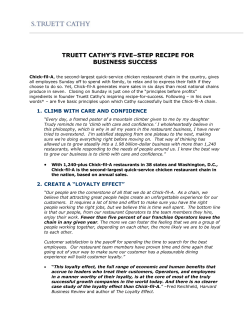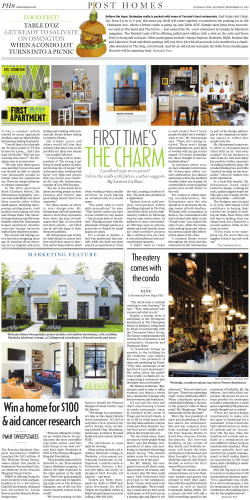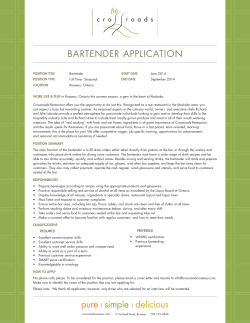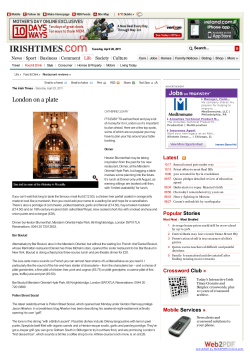
By DANIEL YEE Associated Press Writer 1,122 words
Chick-fil-A cooks up recipe of customer loyalty By DANIEL YEE Associated Press Writer 1,122 words 28 August 2006 11:06 AM Associated Press Newswires APRS English (c) 2006. The Associated Press. All Rights Reserved. EAST POINT, Ga. (AP) - Every week, Harry Moss finds a cozy table at his neighborhood Chick-fil-A restaurant to read the entire newspaper and enjoy a salad garnished with the fast-food chain's staple -chicken. However, he doesn't get to pore through the Sunday paper there. That day is when the fast-food chain's restaurants close to give employees a day of rest, a business decision 85-year-old founder Truett Cathy said has been a big factor in the company's success, by sticking to his doctrine of considering people before profits. Chick-fil-A executives routinely say that the chain's 1,250 restaurants in 37 states, spanning from Georgia to California to Massachusetts, make as much money in six days a week as many of its competitors do in seven. For nearly 40 years, Chick-Fil-A has offered up a taste of the South, from its chicken sandwiches to sweet tea and biscuits and gravy. The Atlanta-based company -- the 25th largest restaurant chain in the U.S. with more than $1.975 billion in sales in 2005 -- has increased revenues by at least 11 percent a year for the past decade. This year is expected to be a major milestone for the company, as its officials estimate Chick-fil-A will cross $2 billion in yearly sales for the first time. "They make good competitors," Cathy said of his larger fast-food rivals. "We can outperform them because we teach our employees the importance to be kind to customers. Your customers become cheerleaders for you and you have to do little advertising, they're worth more than TV and radio." Chick-fil-A is also known for a decade-long campaign of TV and billboard ads that use witty cows who try to make sure people eat chicken, instead of them. "It's extremely clever ... They are positioned in a fast-food arena that's dominated by hamburgers, and it distinguishes them in a humorous way as a non-hamburger fast-food outlet," said Bill Guilfoyle, associate professor of the Culinary Institute of America in Hyde Park, N.Y. "But Chick-fil-A is not just about TV commercials or these billboards," said Guilfoyle. "They're about ... promoting that brand as an upstanding and positive fast-food company." Cathy's entire life has been focused on serving up staples -- as a little boy, he would make money by selling six bottles of Coca-Cola for a quarter and soon "realized a talent for pleasing customers." He later turned his entrepreneurial skills to the restaurant business, opening an Atlanta diner called The Dwarf Grill (named for the short and stout shape of the restaurant) with his brother, Ben, in 1946. But it wasn't until 1961 that Cathy developed Chick-fil-A's trademark sandwich. A company that cooked boneless, skinless chicken for airline meals wanted to sell him pieces that were too big for the airline's needs; Cathy cooked the chicken in a pressure cooker and put it on a buttered bun. He sold the sandwich at independent restaurants for a few years before opening his first Chick-fil-A restaurant at an Atlanta shopping mall in 1967. Chick-fil-A prides itself on its service, making the extra effort to win over customers -- Cathy asks his Page 1 of 2 2010 Factiva, Inc. All rights reserved. employees to faithfully say "My pleasure" whenever customers thank them, for example. "It's a small thing, but ... in our business it's very competitive, so if you can raise yourself above the norm ... and improve customer relations, that's going to be as beneficial to the chain as 'We need to sell more waffle fries.' Truett never says 'Let's sell more waffle fries,'" said spokesman Don Perry. Even at age 85, Cathy still remains involved with the company as its founder and CEO. His son, Dan, is the president and COO. The company is entirely owned by the Cathy family. The efforts win diners such as Camilo Carranza, 38, of Flowery Branch, Ga., who says he eats at Chick-fil-A restaurants at least four times each week. When interviewed, he was enjoying a chicken sandwich for lunch -but admitted that he started the day off with a Chick-fil-A chicken biscuit for breakfast as well. "It's the taste -- the chicken is good," the used auto parts businessman said. "It's very easy to eat here." It's also apparently very easy to want to work there. In a typical year, about 10,000 people apply for about 150 restaurant operator positions open across the country. The company only averages 60 to 70 new restaurants a year, a slower expansion than other fast food restaurants because of Cathy's philosophy of maintaining quality. One reason that so many apply may be that the restaurant only charges franchisees $5,000 to operate the restaurant. The fee for something similar at other fast-food chains can run as high as $500,000, said Mary Adolf, president and chief operating officer for the Chicago-based National Restaurant Association Educational Foundation. The turnover rate for the restaurant's operators -- 64 percent of whom have worked for the company during high school and college -- is 3 percent. Turnover is 1 percent among the company's 575 corporate employees. Adolf called the turnover "very unusual," compared to a typical rate as high as 50 percent among restaurant managers in the U.S. "I don't think there's any chain that creates such a wonderful culture around the way they treat their people and the respect they have for their employees," Adolf said. "It's their passion, it's their culture, they instill it in all their employees and they really work to make sure they're hiring the right people." The chain works to help its employees through programs that include an employee scholarship program and a marriage retreat center at Berry College in Rome, Ga. "It's very important to keep people happy," Cathy said. "A person cannot work hard in the day if they go home to a crying wife or family. It's very important to keep your life in good order." Chick-fil-A has also managed to keep its house in order. It has steered clear of lawsuits -- possibly, Adolf said, by managing to not ruffle anybody's feathers. "It's certainly not uncommon that businesses are involved in disputes -- labor disputes, employee litigation," she said. "The fact there hasn't been anything ... speaks volumes about their practices and their commitment to their employees." -------On the Net: Chick-fil-A: http://chick-fil-a.com 7 Document APRS000020060828e28s001oh Page 2 of 2 2010 Factiva, Inc. All rights reserved.
© Copyright 2025





















